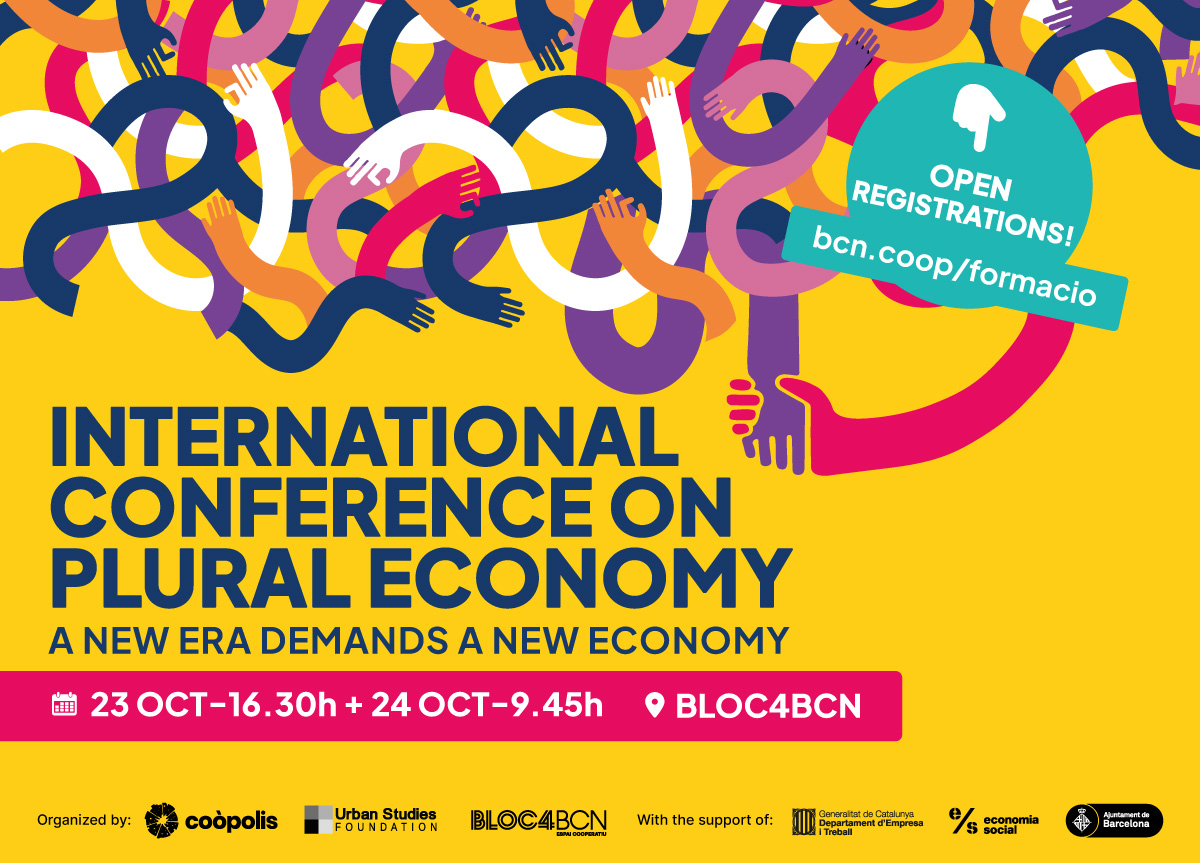The International Conference on Plural Economy stems from a conviction that we at the Observatori Coòpolis have been working on: a new era requires a new economy. A just ecological transition requires an economy that does not hide what sustains our lives: mutual support, social reproduction, ecosystem cycles, reciprocity, etc.
There has long been a tendency to view the economy as a compact block of market relations that allows us to access goods and services. The dominant narrative presents the economy as a homogeneous market guided by supply and demand, driven by the exchange of monetary or financial capital. Beneath this appearance lies a very different reality. The economy not only includes a monetary sphere but also encompasses a whole set of relations and organizational forms that address needs beyond this market circuit. In fact, it far exceeds it.
In Catalonia, unpaid domestic work hours are almost double the paid work hours. It is estimated that ecosystem services account for 250% of the global GDP. We need to discard GDP as a measure of economic success. We must promote and value economies based on redistribution, mutual support, and proximity. The ideology that the capitalist market is the only space for regulating social life and that profit is the only driver of growth is destroying life on the planet. The appropriation of resources and exploitation of labor are left out of spreadsheets.
We must promote policies, regulations, and metrics for economies based on use value. We need to rebuild the economy through concrete practices and policies that aim for a more just world. We need a public, cooperative, and community alliance. The public component can guarantee the general interest and universality; the cooperative sector can strengthen economic democracy and worker participation; and organized communities embody citizen participation and social control of the economy.
This conference aim to gather this potential and address questions such as: What are plural economies, and what are their challenges and dilemmas? What public policies promote public-cooperative-community alliances, and how do they work? How can we measure their impact? What are the strategic areas for an eco-social transition, and how can we intervene in them?
We will do this with entities and experiences from Catalonia, the Basque Country, the USA, Canada, the UK, and Venezuela. To showcase what we are doing, learn from what is being done elsewhere, and strengthen transformative alliances.
PROGRAM
Wednesday 23 October
16.30h | Institutional opening
17:00h | Presentation of the conference. What is plural economy? The plural economy recognizes the coexistence of different forms of economic and productive organization within a society, beyond monetary reductionism. In this opening session, we will share some reflections on this framework and outline the objectives and content of the conference. Speakers: Ivan Miró, Observatori Coòpolis, La Ciutat Invisible and Berta Riera, Observatori Coòpolis i IDRA
17:30h | Round table. Potentials and dilemmas of public-community collaborations. The dominant economy does not operate in an institutional vacuum but is regulated and promoted by public action. What are the social and ecological impacts of the dominant public-private economy? How and why should public-community collaborations be placed at the center of a new economy? Speakers: Mauro Castro, Observatori Coòpolis i IDRA, Keir Milburn, Abundance (Regne Unit) and Sara McKinley, Democracy Collaborative (EUA)
Thursday 24 October |
09:45h | Round table. Plural alliances for a transition policy. What strategies based on alliances between citizens, cooperatives, communities, and public administration have been developed in other territories? What are the limits of these alliances, and how can they be overcome in the face of the public-private empire? Speakers: Marguerite Mendell, Karl Polanyi Institute of Political Economy, Chantier de l’Economie Sociale (Quebec), Juan Lenzo, Unión Comunera de Venezuela (Venezuela) and Kali Akuno, de Cooperation Jackson (USA). Moderator: Bertie Russell, UAB i Abundance (UK)
11:45h | Breakfast at Bloc4Bcn
12:15h | Round table. Measuring the value of the plural economy. How do we measure economies based on redistribution, mutual support, and proximity? What are the opportunities and contradictions when integrating these value forms into public policies? Speakers: Mariona Soler, XES and XEC, Andoni Egia, Hernani Burujabe and Álvaro Porro, Director of Social Economy and Cooperatives of Barcelona Activa. Moderator: Laia Forné, IDRA
14:15h | Joint lunch at Bloc4Bcn
16:00h | Sectorial tables. Intervening in the strategic areas of the eco-social transition. In collaboration with the Circles of Eco-social Transition of Coòpolis, we propose four strategic areas to think about the plural economy in practice: food, energy, housing, and commons. The goal is to share the role of public-community collaborations in each area through concrete practices, understanding these collaborations as a key dimension of a socially and ecologically fairer governance.
FOOD. Access to food through the collectivization of infrastructures focusing on municipal markets.
Invited experiences: ¡Reclama tu mercado!, Azpeitiko Azoka Plaza, Mercat de Puigmercadal de Manresa i Fem Comensalitat
Coordinated by:: Espai Ambiental i Opcions.
Language: catalan-language, no translation
ENERGY. Closing the circuit of energy production, commercialization, and consumption from the plural economy. Invited experiences: Right to energy forum, Collettivo di fabbrica (GKN) i RESCOOP. Coordinated by: Batec. Language: catalan-language, no translation
HOUSING. Decommodifying land: public-community collaboration proposals in housing. Invited experiences: membres de la xarxa de CLT de Brasil, India and NYC. Coordinated by: La Dinamo and Holon. Language: catalan-language, no translation
COMMONING. Democratizing public ownership: international challenges and experiences for public-community governance. Invited experiences: Transnational Institute and Solidarity Research Center. Coordinated by: IDRA and Urban Studies Foundation. Language: english-language, no translation. The places for the ‘Commoning’ workshop are fully booked. If you cannot attend any other workshop due to a language issue, please write to us and we will look for a solution.
19:00h | Closing. Final session by Observatori Coòpolis to share the main ideas from the conference and the future agenda.
Open registrations! -
International Conference on Plural Economy

